SailGP: The Russell Report – Copenhagen
Published on September 1st, 2022
The third season of the SailGP global sports league will be in France on September 10-11, with league CEO Russell Coutts offering his view following the last event in Denmark on August 19-20:
Copenhagen was an amazing venue and from the fans’ perspective, they seemed genuinely blown away by the racing. After racing was canceled on the first day due to light winds, we put a new four-race format in place. The format worked well, we had less down time between races and we had the perfect conditions to try it.
We’d like to adopt that format in future events – particularly on the last day – but it obviously puts a pretty big strain on our shared services team. We’ve known for some time that reducing the gaps between races is a good thing for the audience, but it only works if we can keep all teams racing.
One of the big stories in Copenhagen was the return of Nathan Outteridge, who stepped into the driver role on board the Swiss boat. I was a little bit disappointed by the team’s performance (they finished with a 7-7-5 fleet racing record).
They were going great in practice racing, but that was in a steady, onshore breeze – perfect conditions for a new team. When it came to the racing, it was windier than forecast – about 25 km/h (13.5 knots) with a lot of gusts and lulls.
With those conditions, you really need the team to be in sync with each other and capable of anticipating and reacting to changes quickly. That said, the team was looking much better towards the end of the day and will have learned a lot. It will take time, particularly in those conditions, for Nathan to get the crew sorted, but they’ve got no better instructor to take them through that process.
This was the first event in six where the Australians haven’t made the Final. They had a last minute crew change, with wing trimmer Kyle Langford swapped out for Ed Powys, and although Ed did an incredible job, it was pretty obvious they were missing the vital comms Kyle provides. Having said that, they still finished fourth which is no disaster when you’re missing one of your key players.
I don’t think any SailGP team right now could swap out their wing trimmer or flight controller, and retain the same performance. None of them have the depth to have true substitutes in those key positions and that’s possibly because historically in sailing we haven’t had the need to develop that long term “squad” mentality – but that’s where all SailGP teams need to get to.
This is professional sports, and sponsors and fans will expect their teams to perform, even if a key player is missing due to illness, injury, or some other reason. In many ways, that will begin to put the spotlight on the managers like it does in other professional sports leagues to develop viable back-up plans and a pipeline of future athletes.
I was surprised by how much the Kiwis dominated in Copenhagen. It’s very difficult to have a repeat performance and the conditions were a little different from Plymouth, so I wasn’t picking them to win again. But when the news came through that Kyle Langford was out for the day, and with the British out of the running – that changed things quite dramatically.
While I’m not taking anything away from the New Zealand victory, you’d have to be cautious about overplaying their dominance in this last event. I also think one less boat on the starting line makes quite a big difference with more gaps and room which must favor their late approach to the line.
No doubt they’ve also got better at reading the fleet patterns and lining up 45-30 seconds before the start. Anyway, whatever the reason, their starts were incredibly impressive.
The Australians obviously got caught up with the French in the penultimate run in the last race. Instead of simply keeping clear of the French, which is all they needed to do to qualify for the final, they stayed pretty close to windward of them in a highly vulnerable position. As I said, maybe things were not quite as calm onboard the Aussie boat without Langford.
Then, speaking of the British, it feels a bit like it did for them last season with some bizarre unforced errors. They started out well this season and I was picking them to have a strong performance in Copenhagen. But clearly there was a miscommunication that might prove extremely costly for them.
While the charts indicated there was enough water, the local authorities had warned that they were not accurate outside our designated sailing area because of reclamation in progress. When the British hit the rocks, they were outside the designated sailing area and they destroyed a daggerboard, rudder and, more significantly, the daggerboard case.
No doubt they’ll be feeling incredibly frustrated because whilst we had a spare daggerboard and rudder, we didn’t have a spare daggerboard case onsite. For St. Tropez, we have sent the daggerboard case from boat 10 as a replacement so they will be good to go.
Looking ahead to St. Tropez, I’d never underestimate Ben Ainslie, particularly when he’s in the sort of mindset he’s in right now. But he’ll need to be at his best to beat a full strength Australian team and the Kiwis that are now growing in confidence and sailing their boat with an impressive steadiness.
When it came to the U.S. team, they sailed a very good first race, coming back from a very average start. They sailed through the fleet and ended up second, which was a very strong performance. I thought that might have triggered the turning point for them, but then it started to go sideways and, after a few more errors, it just got worse.
It’s clear they’ve got a lot more thinking to do, especially when teams like the French and the Danes are coming in and performing much better than they are. They need to up their game tactically – something’s definitely not right there.
France had shown promise in Bermuda and Plymouth and I think they could have made the Finals in both those events. They were sailing the boat fast in Copenhagen, but they focused too much on boat-on-boat tactics and scoring penalties on other boats.
That approach might have won France some points here or there, and it certainly ensured they beat the Danes in the Final, but it ruled out any chance of them winning some of the earlier races and lost them some critical points towards the end of the first two races.
If they want to eventually topple the Australians, Kiwis, or the British (once they return to form), they’ve got to shift away from the mentality of being defensive and combative to sailing the boat fast, looking at the wind on the water and choosing the best course. Once their confidence builds and they worry less about being passed and focus on the bigger picture, they’ll be real contenders.
If the Danes hadn’t got tangled up with the French, I think they would have had a real shot of winning that Final. They were sailing well and going fast, but they had poor positioning leading into the start. They set themselves up like a sitting duck and they were just inviting the Kiwis to come underneath and push them out, which was exactly what happened.
Then once they were behind the French, it became a battle with the French intent on protecting second place. The French were probably thrilled to come second whereas the Danes, who had already qualified for a podium race in Plymouth were probably more intent on winning. I think the Danes really believe they can win and are beginning to sail that way, but they need to tidy up some of their positional tactics.
As we enter the final stages of our European tour, we have shorter gaps between events. We’ll be in Saint-Tropez next on September 10-11 and then in Cadiz two weeks later. Both events should be awesome racing and they are both fun cities to visit.
SailGP information – Denmark details – Season 3 scoreboard – Facebook – How to watch
Denmark SailGP Final Results
1. New Zealand, 1-1-1-(1), 10 points
2. France, 6-4-2-(2), 9 points
3. Denmark, 3-2-3-(3), 8 points
4. Australia, 5-3-4, 7 points
5. United States, 2-6-6, 6 points
6. Canada, 4-5-7, 5 points
7. Switzerland, 7-7-5, 4 points
8. Spain, 8-8-8, 3 points
9. Great Britain, 9-9-9, 2 points
Season Three Standings (after four events)
1. Australia, 36 points
2. New Zealand, 32 points
3. Denmark, 28 points
4. Canada, 27 points
5. Great Britain, 26 points
6. France, 24 points
7. United States, 19 points
8. Switzerland, 11 points
9. Spain, 11 points
2022-23 SailGP Season 3 Schedule
May 14-15, 2022 – Bermuda Sail Grand Prix presented by Hamilton Princess
June 18-19, 2022 – United States Sail Grand Prix | Chicago at Navy Pier
July 30-31, 2022 – Great Britain Sail Grand Prix | Plymouth
August 19-20, 2022 – ROCKWOOL Denmark Sail Grand Prix | Copenhagen
September 10-11, 2022 – France Sail Grand Prix | Saint-Tropez
September 24-25, 2022 – Spain Sail Grand Prix | Andalucía – Cádiz
November 12-13, 2022 – Dubai Sail Grand Prix presented by P&O Marinas
January 13-14, 2023 – Singapore Sail Grand Prix
February 17-18, 2023 – Australia Sail Grand Prix | Sydney
March 17-18, 2023 – New Zealand Sail Grand Prix | Christchurch
May 6-7, 2023 – United States Sail Grand Prix | San Francisco (Season 3 Grand Final)
Format for 2022-23 SailGP events:
• Teams compete in identical F50 catamarans.
• Each event runs across two days.
• There are three races on each day, totaling six races at each event.
• The opening five fleet races involve every team.
• The final match race pits the three highest ranking teams against each other to be crowned event champion and earn the largest share of the $300,000 prize money to be split among the top three teams.
• The season ends with the Grand Final, which includes the Championship Final Race – a winner-takes-all match race for the $1m prize.
For competition documents, click here.
Established in 2018, SailGP seeks to be an annual, global sports league featuring fan-centric inshore racing in some of the iconic harbors around the globe. Rival national teams compete in identical F50 catamarans for event prize money as the season culminates with a $1 million winner-takes-all match race.
Source: SailGP

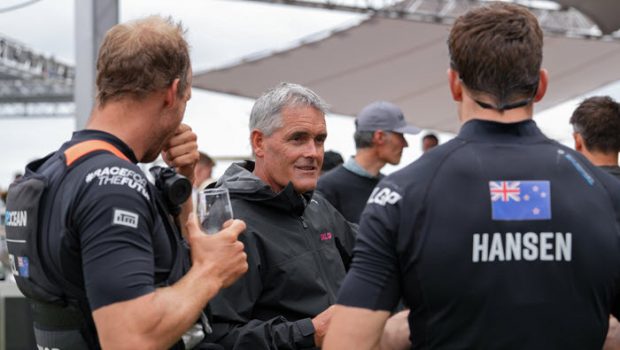


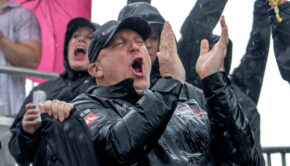
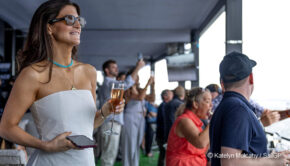
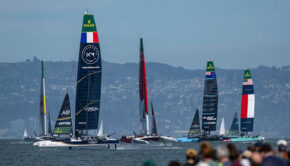
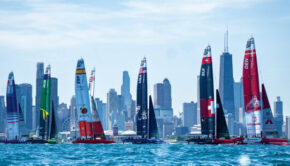
 We’ll keep your information safe.
We’ll keep your information safe.